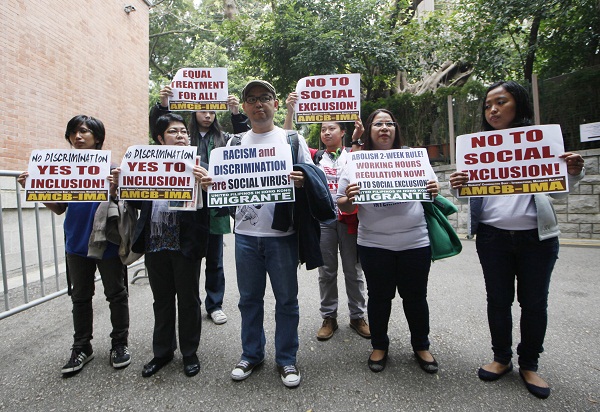Hong Kong court begins hearing on maid residency

Eman C. Villanueva, secretary general of the United Filipinos in Hong Kong, center in front, and other supporters of the Filipino migrants organizations hold placards outside the Court of Final Appeal in Hong Kong Tuesday, Feb. 26, 2013. A Filipino maid has taken her fight for permanent residency to Hong Kong’s top court. Lawyers for Evangeline Banao Vallejos were presenting arguments to the Court of Final Appeal on Tuesday. Her legal team was granted permission last year to appeal a lower court’s rejection of her bid. AP/Kin Cheung
HONG KONG – Hong Kong’s top court on Tuesday began hearing a challenge to the right of abode law in a long-running case that could pave the way for thousands of foreign maids to claim residency in the city.
The Court of Final Appeal hearing, which centers on Filipina maid Evangeline Banao Vallejos, could also reopen the controversial issue of whether children born in Hong Kong to mainland Chinese parents have the right to stay.
Vallejos won a High Court ruling in 2011 granting her the right to request permanent residency status, denied to foreign maids until then.
The government appealed against that ruling last March, successfully arguing the authorities had discretionary power to decide who was eligible for residency and that restrictions on maids were not unconstitutional and discriminatory.
Presenting arguments to the court on behalf of Vallejos and another applicant, lawyer Michael Fordham said: “If… your presence is lawful and your presence is for seven years continuously… you would expect to succeed.”
Campaigners for the rights of migrant workers argue that Hong Kong’s 300,000 maids, mostly from the Philippines and Indonesia, should not be treated any differently from other foreigners who flock to the former British colony to find work as lawyers, bankers, accountants and managers.
Most of those workers are eligible to apply for permanent residency, granting them additional rights and access to government services once they have lived in the city for at least seven years.
“This appeal is about justice and fair application of the law against discrimination and social exclusion,” activist Dolores Ballabares told AFP.
Foreign maids earn a minimum wage of HK$3,920 (US$505) a month and receive benefits such as one guaranteed day off a week but rights groups say they still face discrimination and a lack of legal protection from abusive employers.
A maid’s visa is tied to a specific employer, leaving her in a difficult situation if she wants to change jobs, activists say.
Many live with their employers for years and send portions of their pay back to relatives at home, providing a huge source of foreign remittances to the Philippine and Indonesian economies.
Government officials have warned that making domestic helpers eligible for permanent residency could open the floodgates to hundreds of thousands of residency requests from maids, some of whom have lived in Hong Kong for decades.
The case has also highlighted the issue of the city’s judicial independence from Beijing, while potentially reopening the issue of whether the children of mainland Chinese parents can stay in Hong Kong.
Some lawmakers have said the case should be referred to Beijing for its reinterpretation of the Basic Law, the mini-constitution which sets out the city’s semi-autonomous status and rights since its return to China in 1997.
In 1999 the Court of Final Appeal ruled that children of people who have right of abode also have that right, even if their parents were not permanent residents at the time of their birth.
Hong Kong’s government asked Beijing to “reinterpret” the Basic Law after claiming an extra 1.6 million people in China could obtain the right of abode, causing a severe social and economic strain on the densely populated city.
Beijing subsequently ruled that children born outside Hong Kong were only eligible for right of abode if at least one parent was already a permanent resident.
However, in 2001 the Court of Final Appeal ruled that children born in Hong Kong to mainland parents had right of abode regardless of whether their parents were legal residents.














